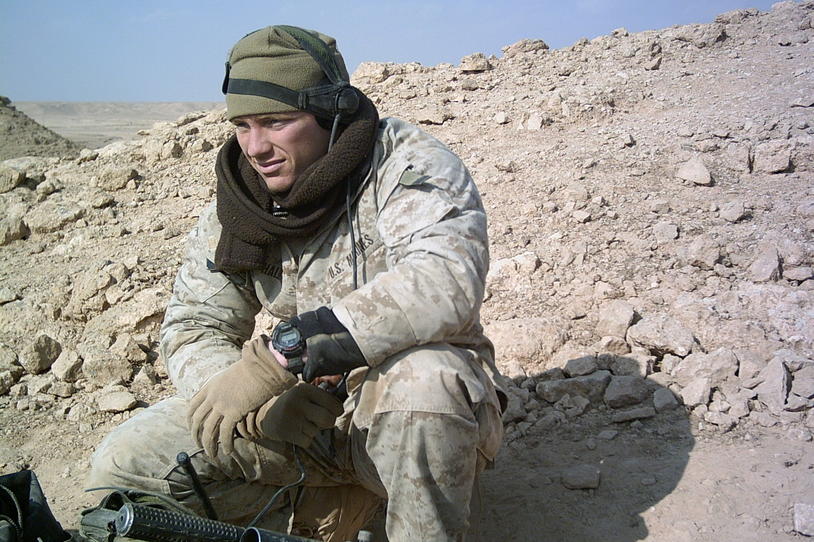
Nick Thalken, former Marine and physician in the Army National Guard, was diagnosed with young-onset Parkinson's disease at age 37.
Did you know that of the more than 1 million Americans living with Parkinson’s disease, 110,000 are military veterans?
A combination of factors plays a role in the development of Parkinson’s disease. This can include stressors associated with military service like traumatic brain injury (TBI) and exposure to burn pits and toxic chemicals like trichlorethylene (TCE), which can increase risk.
Here’s what to know about the links between Parkinson’s and military service, how you can help advocate for veterans living with the disease and how veterans with and without Parkinson’s can help speed a cure.
Resources and Benefits for Veterans with Parkinson’s
Seeing your doctor regularly and watching for symptoms like tremor, slowness, stiffness or acting out dreams can help you stay on top of your health journey. The first signs of Parkinson’s may be mood or sleep changes, which are common among veterans and may not be recognized as early symptoms.
Most veterans do not live with Parkinson’s disease, but if you do receive a diagnosis, The Michael J. Fox Foundation (MJFF) has resources for people newly diagnosed with Parkinson’s including tips for building a care team, exercising regularly and maintaining a healthy diet.
Many U.S. veterans with Parkinson’s have access to specialized medical care through The U.S. Department of Veterans Affairs (VA) Parkinson’s Disease Research, Education and Clinical Centers (PADRECCs). You may also be eligible to receive free or low-cost health care and disability benefits through the VA. That’s because the VA recognizes Parkinson’s as a “presumptive condition” linked to Agent Orange, Camp Lejeune water contaminants and moderate to severe TBI. This means that veterans with Parkinson’s who have been exposed to these chemicals or have experienced TBI during their military service do not have to prove a connection between their service and Parkinson’s diagnosis to receive these benefits.

“Since I served in Vietnam, my Parkinson’s is presumed to be from exposure to Agent Orange or other herbicides. A related condition, insomnia, was dramatically reduced by a combination of services provided by the VA and medication.”
— Jim Harvey, Army veteran and research participant
Advocate for Veterans and Military Servicemembers with Parkinson’s
Veterans deserve the highest quality care and comprehensive research to better understand how service-related exposures and stressors may increase their Parkinson’s risk. That’s why MJFF and our nationwide network of policy advocates have long championed government policies and programs that make a difference for military servicemembers and veterans with Parkinson’s.
Over the years, these efforts have contributed to tangible policy changes. In 2018, the VA expanded access to telemedicine services. In 2019, Congress passed the Blue Water Navy Vietnam Veterans Act so that veterans with Parkinson’s who had been exposed to Agent Orange could receive disability benefits and expanded those benefits in 2021. In 2023, the U.S. Environmental Protection Agency proposed a ban of TCE.

“I was stationed at Camp Lejeune back in the ’80s when the water was contaminated with TCE and other toxins. We need better-funded research that keeps up with the demand of the Parkinson’s population that’s growing and growing.”
— Amy Lindberg, retired Navy officer and patient policy advocate
Our advocacy continues as we urge Congress to increase annual funding for the PADRECCs and The U.S. Department of Defense Parkinson’s Research Program (PRP).
The PADRECCs provide multidisciplinary care, education and outreach to veterans living with Parkinson’s and other movement disorders. In addition to six standalone facilities at VA Medical Centers, the program coordinates a network of over 50 regional affiliated sites across the VA health system staffed with neurologists and Parkinson’s specialists for those who can’t travel to the main sites.
One of the only government-funded research programs specifically dedicated to Parkinson’s, the PRP has played a pivotal role in advancing our understanding of the early progression of the disease through research like the Parkinson Associated Risk Study led by MJFF scientific advisory board member Kenneth L. Marek, MD.
Research funded by the PRP has supported discoveries in head injury biomarkers and deepened our knowledge of the biochemical basis of depression and neurodegenerative disease risk in military servicemembers. The PRP also drives key research on the ways in which interventions like diet and exercise can mitigate Parkinson’s symptoms.

“I’ve had two traumatic brain injuries in the Army and have had chemical exposure. My diagnosis blindsided me and having it connected to my service brings up all sorts of emotions. At some point you have to get up and do something. For me, doing something means being an advocate and sharing my story and listening to others.”
— Reverend Mark Kelm, Army veteran and MJFF policy advocate
Investment in programs like the PRP and PADRECCs can open doors to research breakthroughs, accelerate new treatments and improve access to care for veterans. Yet, funding for the PRP has stagnated despite the nearly 40 percent growth in the number of U.S. veterans diagnosed with Parkinson’s between 2001 and 2018.
In the spring of 2024, hundreds of advocates joined MJFF for meetings with over 250 congressional offices to highlight the need for greater funding for the PRP. These conversations resulted in a letter signed by 94 bipartisan members of Congress to urge their colleagues in the U.S. House of Representatives to allocate more funding for the program. In October 2024, MJFF worked with Congresswoman Nanette Barragán (D-CA), whose father lived with Parkinson’s, to rally 33 additional representatives to join the call to action.
We know that raising our voices works — Congress has approved funding increases for the PADRECCs for the last two years thanks in part to your advocacy. This will help the centers begin to expand outreach and services, but the work continues to ensure Congress sustains or boosts the budget for the PADRECCs in 2025 and beyond.
You can help amplify our call to action by using this simple form to let your members of Congress know how critical their support of these programs is.

“I was diagnosed with young-onset Parkinson’s disease at the age of 37. The Michael J. Fox Foundation and thousands of advocates work tirelessly to champion legislative action to support research and care for veterans living with PD. This Veteran’s Day, we recognize and honor all our service members and urge Congress to support veterans like me, to invest in PD research and care services.”
— Nick Thalken, pictured here with his family
How Veterans Can Help Speed Parkinson’s Treatments and Cures
Veterans — regardless of health status or location of military service — have valuable experiences to contribute to research. The Vet-PD Research Study is currently accepting veterans with Parkinson's at 24 sites across the U.S. Vet-PD contributes key data to the Global Parkinson's Genetics Program (GP2) which partners with groups around the world to transform understanding of Parkinson's genetics.
MJFF’s landmark study, the Parkinson’s Progression Markers Initiative (PPMI), welcomes veterans with and without Parkinson’s. PPMI follows participants over time to learn more about how disease starts and changes. That information can help doctors and scientists better diagnose, treat and even prevent brain disease.

“My commitment to the Parkinson’s community, from the moment of my diagnosis, has been to take whatever opportunities that come along, raise my hand and say, ‘I’m available.’ If it has the potential to move the needle forward, bring us in a positive direction toward a cure or even understanding of the disease, count me in.”
— Leonard Chandler, Air Force veteran, MJFF Patient Council member and research participant
MJFF launched PPMI in 2010. Since then, the study has changed how research is done and what scientists know about the brain. In 2023, PPMI researchers discovered the first Parkinson’s biomarker — a tool that can detect the earliest biological signs of the disease in living people.
The new biomarker tool is already making clinical trials cheaper, faster and more effective. It’s also changing how we think about the disease and its symptoms, paving the way for a more personalized approach to treatment. And in September 2024, the U.S. Food and Drug Administration issued a letter of support endorsing use of the biomarker in research and clinical trials.
Help advance more breakthroughs by joining PPMI, the study that’s changing everything. Already signed up as a Vet-PD or PPMI volunteer? Check out the latest studies recruiting new participants.